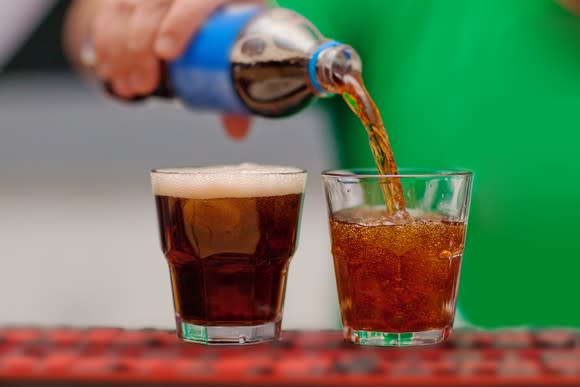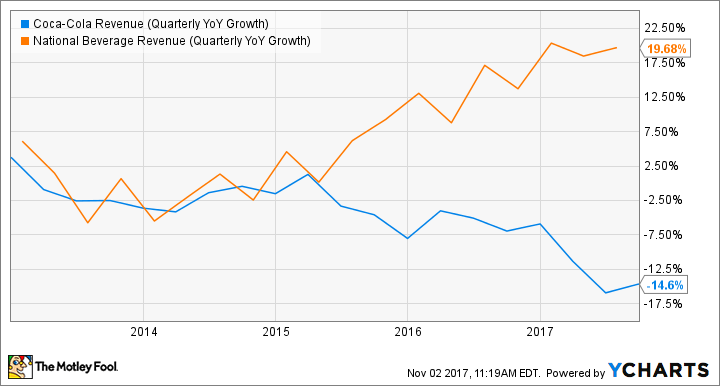Better Buy: Coca Cola vs. National Beverage
Investors today are often confronted with a choice: Buy the exciting (but expensive) disruptor or the threatened (but less expensive) incumbent? Think Tesla versus General Motors, Amazon versus Wal-Mart, or Netflix versus Walt Disney.
As it turns out, the beverage world is no different. Today, let's pit National Beverage (NASDAQ: FIZZ), owner of the hit sparkling water brand La Croix, against 131 year-old industry giant Coca-Cola (NYSE: KO).
Growth
At first glance, the difference between each company's growth prospects couldn't be more stark. National Beverage posted 20% revenue growth and 31% operating income growth in the most recently reported quarter, while Coca-Cola posted a 15% revenue decline along with a 7% decline in operating income.
Data by YCharts.
However, these numbers don't tell the whole story. Coca-Cola is in the process of refranchising its bottling operations worldwide, a multi-year effort which should be completed in 2017. Since the company is proactively divesting businesses, that will depress revenue in the near term before potentially evolving into a higher margin, capital-light business going forward.
In addition, Coca-Cola has been battling currency headwinds for the past few years. The company only derives about 30% of its sales from North America, so a strong dollar will depress revenue and earnings from markets abroad. National Beverage, on the other hand, still does most of its business in the U.S.

Image source: Getty Images.
So while headline numbers looked bad for Coca-Cola, its "organic revenue" -- which filters out the effects of currency and divestitures -- was actually up 4% as operating margin expanded significantly as well. In this light, the industry leader's numbers don't seem so bad.
But National Beverage's numbers are also misleading. The company doesn't break out brand-level sales for its popular sparkling water La Croix, but it did reveal in the most recent annual report that La Croix grew over 70% in 2016, far faster than the overall company. With consumers shunning traditional soda, sparkling water consumption going up, and the company's smaller scale, National Beverage can continue to grow at a faster pace for years.
Winner: National Beverage
Valuation
With so much change taking place at Coca-Cola due to its reorganization, let's look at the forward price-to-earnings multiple for each company:
Company | Market Cap | Foward Price-to-Earnings |
The Coca-Cola Co. | $195.1 billion | 24x |
National Beverage Corp. | $4.5 billion | 31x |
Data source: S&P Capital IQ. Chart by author.
Here, Coke comes out on top with prospective investors paying less for a stake in the massive company. However, the stronger growth at National Beverage will naturally come at a price. Is that a premium you want to pay? That's going to come down to what kind of investor you are.
Winner: Tie
Dividends
At first glance, the dividend comparison also seems like a no-brainer. Coke offers shareholders a 3.2% yield, while National Beverage doesn't even pay a regular dividend. Moreover, Coke has raised its dividend every year for the past 55 years, putting it in the esteemed company of the dividend aristocrats (and dividend kings).
Once again, however, these numbers can be misleading, since National Beverage occasionally pays shareholders a special dividend. This year, the company paid two separate $1.50 special dividends to shareholders. As of this writing, those payments represent a 3.1% yield -- not too far off from its bigger rival. And this was no one-off event -- since 2004, National Beverage has paid eight special dividends totaling $11.66 per share.
Despite that impressive tally, the discipline Coca-Cola has shown with consistent dividend payments and annual raises over several decades tips this contest in its favor.
Winner: Coca-Cola
Safety
While both companies have diverse portfolios, they both face the most exposure to single brands. For the industry giant, it's the namesake Coca-Cola, which made up 45% of its case volume last year. Meanwhile, National Beverage is overly dependent on La Croix, which Maxim analyst Anthony Vendetti estimates at 50% of company revenue. Vendetti is also worried that its other brands are either stagnant or in decline.
Despite consumer trends working against its favor, Coke has the size and scale to buy or develop the next era of its brand portfolio. For example, the company just acquired Topo Chico, a small sparkling water label from Mexico, for $220 million. Diversification for National Beverage will require the company to not only find the right complementary products but also grow them into the same marquee offering that La Croix has become. As you can imagine, that's no easy task.
Winner: Coca-Cola
The winner?
Though the official tally should crown Coca-Cola the winner, the choice between these two beverage companies largely depends on what type of investor you are. For those who value stability and income in an industry-leading business that also happens to be in the middle of optimizing and diversifying its portfolio, Coke is the pick for you. But for investors with greater risk tolerance looking for more of a growth opportunity, pay attention to National Beverage.
More From The Motley Fool
6 Years Later, 6 Charts That Show How Far Apple, Inc. Has Come Since Steve Jobs' Passing
Why You're Smart to Buy Shopify Inc. (US) -- Despite Citron's Report
John Mackey, CEO of Whole Foods Market, an Amazon subsidiary, is a member of The Motley Fool’s board of directors. Billy Duberstein owns shares of Amazon, General Motors, Netflix, and Walt Disney. The Motley Fool owns shares of and recommends Amazon, Netflix, Tesla, and Walt Disney. The Motley Fool has a disclosure policy.

